|
A great general believed in upholding the following statements regarding the four disharmonies:
Most meditation approaches laud lesser results such as spiritual penetrations, good feelings (that make you “smile”), etc. In contrast, a major objective of Chan meditation is to realize the state of No Thoughts.
The state of No thoughts can simply described as:
The king of the Sở country was on a hunting trip. He misplaced his bow. His entourage was actively looking for it but he said, “Never mind! A man from Sở lost a bow, a man from Sở would find it: there is no loss!”
When Confucius heard of the story, he sighed, “The Sở king is such a small thinker! Why did he specify Sở people? Wouldn’t it be better that he said,“A man lost a bow, another man will find it”?” In ancient China, Lưu Ngưng Chi had the reputation of being a man of principle. He gave his share of his inheritance to his siblings because he wanted to earn his own livelihood without depending on anybody. He even refused to become an official and chose to travel everywhere instead.
One day, someone came and claimed that the shoes that Lưu was wearing was his. Lưu immediately gave up his shoes without any resistance. Later, the same man found his own shoes and came to apologize and wanted to return Lưu’s shoes. Lưu categorically refused. One of my students texted me and complained that I often took her for granted and that she felt that I did not appreciate her contributions at all.
I texted in reply the following: “I am very sorry you feel that way. But that is just life. “For example, as monks, we open our doors to everyone old or young, man or woman, white or colored, Buddhist or atheist and so forth. Therefore, quite often people come and take advantage of us repeatedly.  A master painter offered some of his works to the king. The king asked, “What is difficult to draw?” The artist replied, “Drawing dogs or horses is rather difficult.” “What is easy to draw?” The king pursued. “Ghosts and spirits.” was the reply. “Why is that?” The king asked. 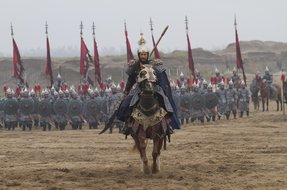 During the Warring States era in China 春秋末战国, the Lu King of Lu country 鲁国wanted to conquer his neighboring country. Mo Zi 墨子, a renowned Chinese philosopher, heard of it and went to try to talk him out of it, saying, “If in this country of ours, the larger provinces attack the smaller provinces, the stronger families attack the weaker families, killing and stealing from each other, what would your Highness think?” The Lu King answered, “They all are my subjects. If the stronger bullies the weaker, stealing from each other, then it is a very serious crime that must be severely punished.” 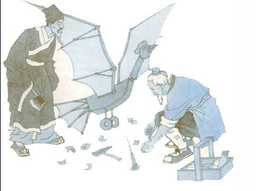 Mo Zi 墨子, a renowned Chinese philosopher, during the Warring States era in China 春秋末战国 took three years to make a wooden kite. After it was flown for a day, it broke. His disciples praised him, “It is incredible that you made a wooden kite that can fly!” “It took me three years to make that wooden kite.” Mo Zi said. “However, it could only fly for a day before it broke down. How can one be proud of that? Take the cart maker. He used some wood and in a day can make a cart that can carry heavy loads for long distances for long time periods: that is real skill!” 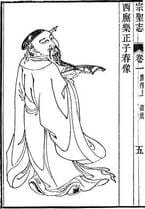 The country of Lu 鲁国 was a small country of the Warring States era, and had a priceless censor. Its larger neighbor’s king demanded it as a tribute. The Lu king did not wish to give up the national treasure, and therefore had a fake censor made and intended to present it as the original. The sovereign ruler said, “If his adviser Nhạc Chính Tử 樂正子 (Zeng Zi’s famous disciple) brought it here himself, only then would I believe that it is genuine.” The King of Lu asked Nhạc Chính Tử to bring the fake censor to the sovereign king. 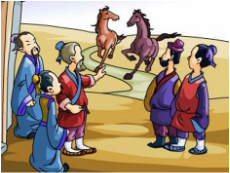 There was an old man who lived in the border area of the country. He raised a horse. One day, the horse ran away and was not to be found anywhere. His friend came to express his sympathy. He said, “You never know. Losing that horse may actually be a blessing in disguise!” A few months later, the horse came back and brought another one with it. His friend came to congratulate him. He calmly replied, “Getting another horse may actually be a misfortune!”  The Buddhas warned against laziness. They say that lazy people are prone to doing evil. Therefore: 1. We should train our children and the young to be diligent instead of spoiling them. 2. Adults should apply themselves to pursue worthwhile endeavors to contribute to society.  There is a Chinese verse: If the river is clear I’ll simply use its water to wash my hat; If the river is muddy then I’ll get its water to wash my feet. When Confucius heard of the verse, he told his students: “Did you hear? Man must accord with the river’s water. It’s really up to the river to decide which way to go independently of any outside influence.”  A great official often sighs even during his leisure time. One of his disciples asked why. The official said: “I wish all nations would get along with each other so that we could do away with all the weapons of destruction. I also wish that great men would train even more great men so that the remaining small men would have no choice but to withdraw and disappear." 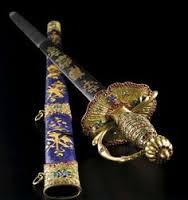 Duyên Lăng Qui Tử, was an ambassador during the晋 Jìn Dynasty. One day, he visited a neighboring country’s king while wearing his priceless jeweled sword. The king admired the sword tremendously and wanted to ask for it but did not express his wishes. However, Duyên Lăng Qui Tử had to represent his country to yet another powerhouse nation and therefore decided that he would offer up the sword when he doubled back after his mission was accomplished.  Thunder cannot be muffled so that it can harmonize with the sound of bells and whistles. Sunlight or moonlight cannot be bent so as to illuminate an alleyway or a hidden cave. Rivers cannot be squeezed so that they are easier to cross. Tall mountains cannot be lowered in order to make it easier to climb. Likewise, great men cannot compromise themselves in order to be accepted by the masses. 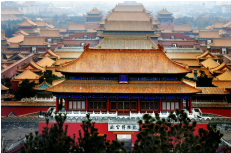 To Tan had to wait for three days before he could get an audience with the King. After he presented his thoughts, he prepared to take his leave. The King said: “I heard that you are a man of great talent and wisdom. You traveled a long distance to come here. Why are you leaving in such a hurry?”  During the Han Dynasty in China there was a wise man called Bang Cong. He was even-keeled and composed and avoided noisy and crowded places. He and his wife were very courteous toward one another and treated each other like guests. One day, an official friend came for a visit and found him working in the field. Bang Cong came up to talk with his friend while his wife and children continued their field work below.  The Buddha said that there are four kinds of yokes:
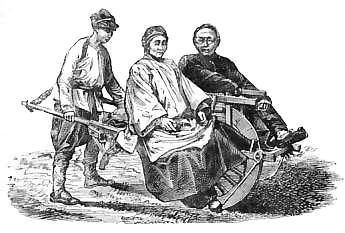 The Buddha said that his disciples should repay their parents’ kindness. He said: “Even if you were to carry your mother on one shoulder and your father on the other shoulder for 100 years, and were to look after them by anointing, massaging, bathing, and rubbing their limbs, and they were to defecate and urinate right there [on your shoulders], you would not in that way pay or repay your parents.”  The Buddha said that there are four wheels which when endowed, will bring prosperity, and in the near future, will help achieve greatness and abundant wealth:  The Buddha said that one can go off course because of four reasons:
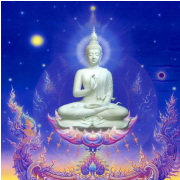 As the Buddha recollects his journey to Buddhahood, he said that throughout his wanderings on the Reincarnation Wheel, he accomplished many meritorious acts. As a result, his existences were: blissful, desirable, pleasing, charming, and endearing.  The Buddha said that there are three kinds of drunkenness: 1. Of youth 2. Of health 3. Of life It is called drunkenness because there is a lack of discernment and as a result, one engages in rash behavior. For the sake of the world great men value their personal character and avoid compromising themselves. To value one’s personal character, one should reduce desire, be less greedy and disengage from plotting for fame and profit.
|
|
RELATED LINKS© 2010 – 2023 Chanpureland.org
|
SubscribeJoin our mailing list today!
|
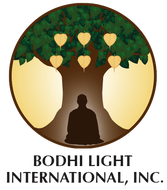

 RSS Feed
RSS Feed